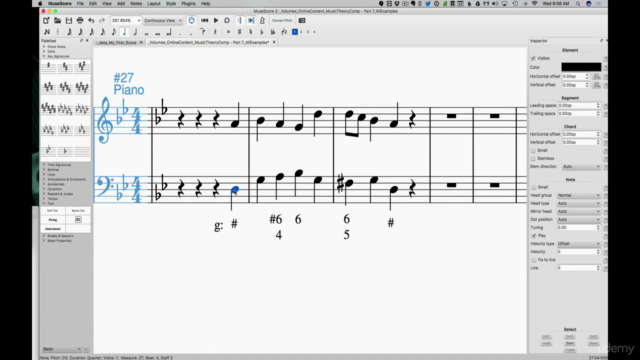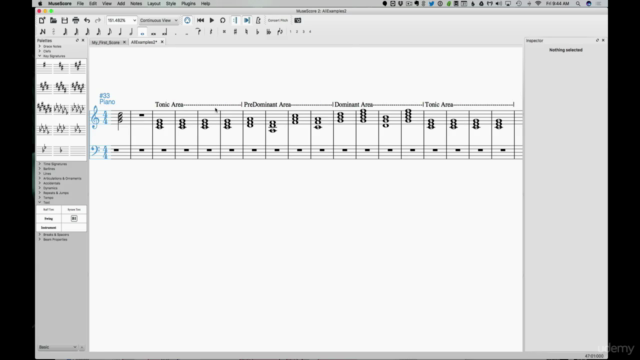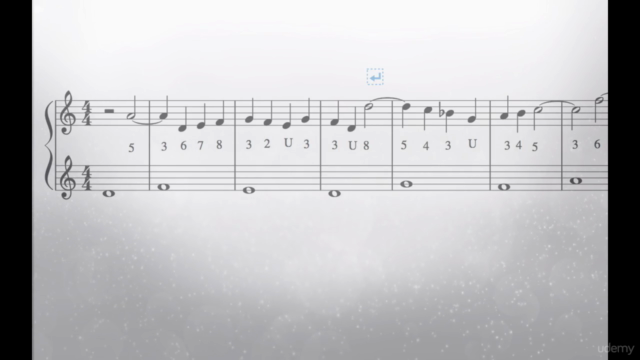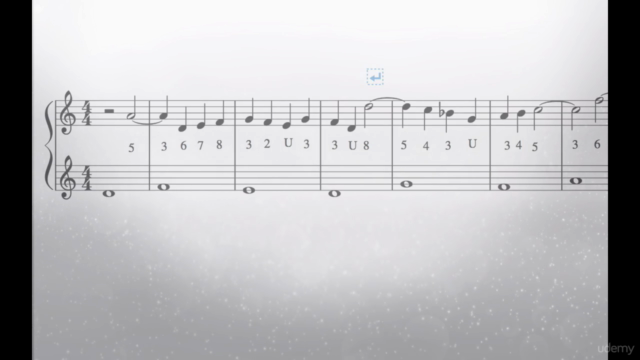Music Theory Comprehensive Complete: Part 7, 8, & 9

Why take this course?
🚀 Introduction to Harmonization Steps and Music Theory Mastery
Welcome to the most comprehensive music theory learning journey you'll find! This course is designed to take you from the basics of harmonization to the intricacies of advanced chord progressions, all rooted in practical, real-world applications.
🎼 What You'll Learn:
- Harmonization Steps - The fundamental process of creating chords and progressions from a given melody or bass line.
- Finding Cadences - Identifying and using cadences to conclude phrases and sections with clarity and impact.
- Finding the Right Chord Progression - Discovering chord sequences that convey the intended emotion and harmony.
- Finding the Right Inversions - Learning when and how to invert chords for smoother voice leading and more interesting harmonic textures.
- The Cadential 6/4 - Understanding and implementing this essential chord in creating smooth phrase endings.
- Chord Function - Exploring the roles of different chords within a progression, enhancing your understanding of harmony.
- Writing Cadential 6/4 Chords - Practical exercises to help you incorporate the cadential 6/4 into your compositions.
- Neighboring 6/4 Chords - Using these chords for smooth transitions between phrases.
- Pedal 6/4 Chords - Utilizing sustained harmony to create a sense of repose or tension in music.
- Writing Neighboring 6/4 Chords - Techniques for neighboring chord motion that adds fluidity to your progressions.
- The Arpeggiating 6/4 Chord - Learning how to spread out the notes of a 6/4 chord for melodic and harmonic effect.
- Parallelism in Music - Understanding and effectively using parallel motion in your compositions.
- New Analysis Notations - Introduction to modern methods of musical analysis.
- The V7 as a Tonic Expansion - Exploring the dominant seventh as an expansion of the tonic chord.
- Other V7 Expansions - Diving deeper into various expansions of the dominant seventh chord.
- Double-Neighbor V7 Expansion - A technique for creating a more complex harmonic motion around the dominant seventh.
- Submediant Expansions - Harmonizing the submediant (VI) chord and its expansions.
- Chord Progression Sequences - Learning progressions that flow naturally from one chord to the next.
- Descending Fifth Progressions - Understanding and applying these common progressions in minor keys.
- Descending Sequences in Minor - Adapting descending fifth progressions for a minor tonal context.
- Other Fifth-Related Progressions - Exploring variations on the fifth sequence.
- Music Theory Applied to Songs - Analyzing popular songs to see how these principles are applied in practice.
🎓 Why Choose This Course?
- Practical Focus: Tailored for both beginners and intermediate students, this course emphasizes practical application over theoretical knowledge.
- Exclusive Content: Registered students will receive ongoing content updates, worksheets, and exclusive discounts on future classes.
- Engagement and Support: You'll have access to a community of like-minded learners and the support of an instructor quick to address questions and provide resources.
- Comprehensive Learning: From basics to advanced concepts, this course covers all aspects of harmonization and music theory.
🎶 Your Music Theory Journey Awaits!
Join us on this journey to master the art of harmony and transform your musicianship. Whether you're a composer, songwriter, or simply passionate about music, this course will provide you with the tools and knowledge you need to create compelling and expressive music.
Enroll now to unlock the full potential of your musical creativity! 🎸
Testimonials from Past Students:
- "Excellent explanations! No more or less than what is needed." - A. Tóth
- "Very COOL. I've waited for years to see a good video course, now I don't have to wait anymore. Thank You!" - Jeffrey Koury
- "I am learning LOTS! And I really like having the worksheets!" - A. Deichsel
- "Jason is really quick and great with questions, always a great resource for an online class!" M. Smith
Remember, as a student of this course, you're not just learning music theory; you're embarking on a journey to become a master of harmony and musical expression. Welcome aboard! 🌟
Course Gallery




Loading charts...
Comidoc Review
Our Verdict
The Music Theory Comprehensive Complete: Part 7, 8, & 9 course on Udemy offers a thorough exploration of advanced music theory concepts, building upon prior classes in the series. It's suitable for various musicians—from violinists to self-taught guitar players—seeking to improve their composing abilities. The engaging and passionate instructor uses detailed explanations, real-life examples, and practical exercises throughout the immersive learning experience. Nevertheless, minor issues with video playback or MuseScore files and a slightly messy presentation could be improved upon for an even better user experience. Additionally, some advanced topics may appear less practical to certain students, who might find them challenging to grasp due to their perceived lack of relevance in composition. Overall, this course offers significant value, equipping learners with the building blocks needed for successful music composition while providing a refreshing and engaging approach to understanding complex music theory concepts.
What We Liked
- Covers advanced music theory concepts in a comprehensive and college-level manner, building upon prior classes in the series
- Explanations are clear, detailed, and supplemented with real-life examples and practical exercises for better understanding
- Instructor is engaging, passionate, and approachable, creating an immersive learning experience that feels like a conversation at a lounge bar
- The series has helped numerous students—including violinists, guitarists, and self-taught musicians—to enhance their composing skills
Potential Drawbacks
- Occasional video crashes or issues with the MuseScore download files, which can be inconvenient but are typically resolvable by trying different browsers or converting files
- Some advanced topics might seem boring or less practical to certain students, who may struggle to grasp their relevance in a compositional context
- Given the increasing complexity, there is room for polishing some content to minimize mistakes and ensure that all explanations are as clear as possible